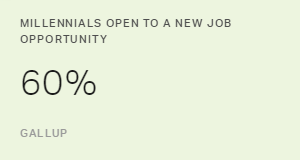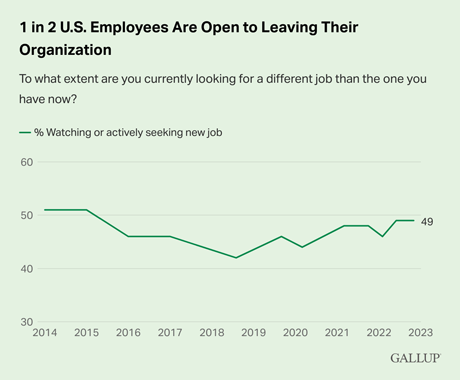Story Highlights
- Millennials most likely generation to switch jobs
- Six in 10 millennials are open to new job opportunities
- Millennials are the least engaged generation in the workplace
Millennials have a reputation for job-hopping. Unattached to organizations and institutions, people from this generation -- born between 1980 and 1996 -- are said to move freely from company to company, more so than any other generation.
The data support this. A recent Gallup report on the millennial generation reveals that 21% of millennials say they've changed jobs within the past year, which is more than three times the number of non-millennials who report the same. Gallup estimates that millennial turnover costs the U.S. economy $30.5 billion annually.
Millennials also show less willingness to stay in their current jobs. Half of millennials -- compared with 60% of non-millennials -- strongly agree that they plan to be working at their company one year from now. For businesses, this suggests that half of their millennial workforce doesn't see a future with them.
Since many millennials don't plan on staying in their jobs, it makes sense that they are hunting for new positions. Gallup found that 60% of millennials say they are open to a different job opportunity -- 15 percentage points higher than the percentage of non-millennial workers who say the same. Millennials are also the most willing to act on better opportunities: 36% report that they will look for a job with a different organization in the next 12 months if the job market improves, compared with 21% of non-millennials who say the same.
Millennials' Engagement Lower Than That of Other Generations
Why are millennials so likely to move around? There are many potential reasons, but one could be their low engagement in the workplace. Gallup has found that only 29% of millennials are engaged at work, meaning only about three in 10 are emotionally and behaviorally connected to their job and company. Another 16% of millennials are actively disengaged, meaning they are more or less out to do damage to their company. The majority of millennials (55%) are not engaged, leading all other generations in this category of worker engagement.
Not engaging millennial workers is a big miss for organizations. The millennial workforce is predominantly "checked out" -- not putting energy or passion into their jobs. They are indifferent about work and show up just to put in their hours.
It's possible that many millennials actually don't want to switch jobs, but their companies aren't giving them compelling reasons to stay. When millennials see what appears to be a better opportunity, they have every incentive to take it. While millennials can come across as wanting more and more, the reality is that they just want a job that feels worthwhile -- and they will keep looking until they find it.
Attraction and Retention Strategies Matter Equally
Millennials are consumers of the workplace, and they are willing to investigate and pursue positions with other companies. For leaders, the current challenge is twofold: They must understand how to attract the millennial workers who are looking to leave their current organizations, but they must also understand how to retain their existing millennial employees.
Download Gallup's latest report, How Millennials Want to Work and Live, to get further insight into what millennials really want from a job, manager and company, and what organizations can do to become this generation's employer of choice.

